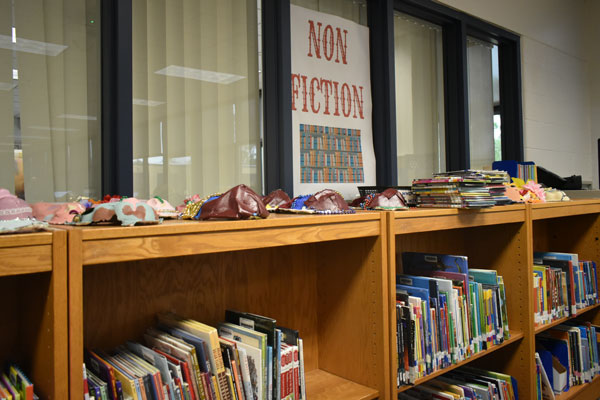Godfrey-Lee — Godfrey-Lee’s team of librarians are on a mission to get books in the hands of students.
Library Media Specialist Harry Coffill and media paraprofessionals Susan McCaffrey and Jennifer Miller collaborated to write a grant for more non-fiction books at the Godfrey Elementary media center.
Their efforts were rewarded with a $5,000 grant from the Laura Bush Foundation for America’s Libraries, which supports school libraries with the greatest needs and encourages students to develop a love of learning and reading.

“We are excited to use these funds to revitalize our library collection with dynamic new reading materials for our elementary students,” Coffill said. “This will allow us to make some exciting additions to some of the most popular subjects in our non-fiction collection.”
Godfrey Elementary was one of 300 schools in the country to receive the grant funds, which will allow them to double the size of their library’s current non-fiction section.
Coffill discovered the need for more non-fiction books after watching students check out biographies and subject-specific books all year.
“I specifically wrote the grant for non-fiction because it’s not flashy or colorful, and non-fiction reading is an important skill,” he said. “Kids love sports and animal books, world record books and they’re not flashy and sparkly subjects.”
Before new books can move into the shelves next fall, librarians need to weed books that haven’t been checked out in a while, like weeding a garden for new plants to grow.
“We offer the books we weed out to teachers and then gift them to students with the hopes they will start their own libraries at home,” Coffill explained. “We also recycle books that are out of date or considered culturally inappropriate.”
Teachers also gave their input for book ideas based on their needs or students’ interests, including American History, World Wars I and II and animals “with sharp teeth.”
“There is a freedom in reading and learning from non-fiction and a bit of starvation for history and learning about real-life things. Kids love that stuff,” Coffill said. “If students don’t identify as readers, they can find a book on something they’re interested in.”
When students need to conduct research for assignments, Coffill is excited for them to have the opportunity to learn how to use the library as a resource.
“Some kids do better when you hand a book to them for research,” he said. “They slow down and experience and process the information.”
He added: “Kids need to have books in their hands and are excited to have access to books.”












